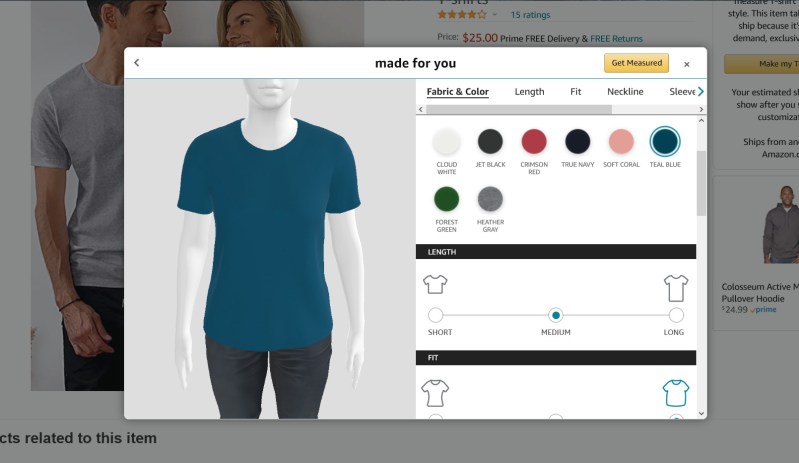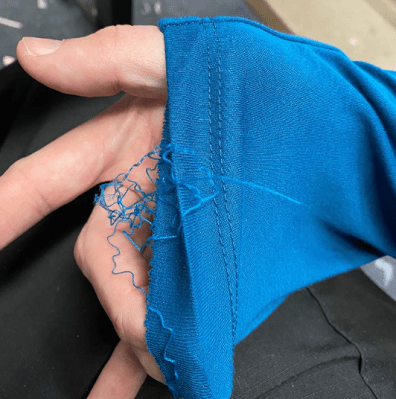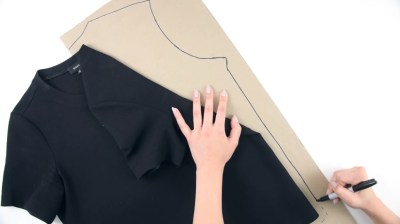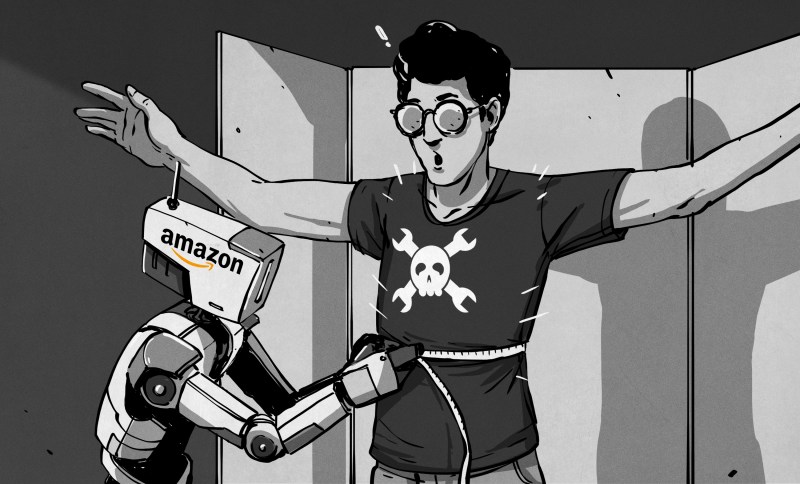How far would you go in pursuit of the perfect black t-shirt? Would you let Amazon build a virtual double of your body? They already know so much about you, so what’s a body scan or two between customer and company?
So here’s the deal — Amazon is trying to launch a brand of bespoke clothing called Made for You, and they’re starting with custom solid color t-shirts. Here’s how it works: you give them $25 along with information about your height, weight, and skin tone. Then you upload two pictures of your torso to their app, and these get turned into a 3D model of your body. Once your avatar is built to match, you design your shirt to fit the model. In theory, you get a really good idea of how it will fit.
You can choose from two different fabrics and eight colors, and can customize the neckline, the shirt length, and the sleeve length. If you want to, you can put your name on the tag. Then your perfect t-shirt gets made in the US from imported fabric — either lightweight or medium weight pima cotton. We’re not sure if robots or people are making them, but our money is on people. After all, Amazon is the company that created Mechanical Turk to form a pool of humans available to do on-demand work via the Internet. This is along those lines but with tailors sewing to your specifications. The big questions are what do you get, how does the technology make these better than off-the-rack, and do you give up your privacy in return?
One-Size Fits One
To say that these are custom t-shirts is a bit of a stretch. Oh you don’t need to worry about the t-shirts being skin-tight and showcasing your spare tire — if it’s a relaxed fit you want, that’s one of the options. But the current options are limited.

There are three lengths to choose from which is admirable, but only two necklines. They don’t even offer 3/4 sleeves, just short and long. This is Amazon’s chance to give us real choices, and we say the choices are a lukewarm offering. It’s nothing compared to the custom Converse menu, which even allows two different sizes of shoe in your pair if that’s what you need.
T-shirts are really just the beginning. Amazon wants to expand this service to other clothing items and are open to suggestions, though they envision dresses, pants, and activewear in the near future. Their would-be clothing empire would stand in addition to the shoe and clothing sites that can already be found in the site’s footer like Zappos, and all the Amazon Essentials-branded clothing.

They’re Probably Just Average T-Shirts, But Now I’m Curious
Reviews are mixed — some people are in love with theirs, and others were dismayed by a poor fit and a hem that began to unravel after an hour of wear. This is anecdotal and it’s not unheard of to have bad hems when shopping off-the-rack. Time will tell if there are actually issues with QA in this on-demand clothing model.
The problem is that fitting clothing is not a trivial process — is there some secret sauce here to reliably capture your body shape? Unlike some other companies that take a video of you and create a point cloud of your body, Amazon makes their you-vatar from two pictures and data that you enter.
Personally, I’m conflicted. I want to try it because I know that pima cotton feels really nice, but I don’t think I want Amazon to have such a detailed picture of my mass and topography. I like my shirts big, so maybe I could fudge my weight and throw off my avatar, but build the shirt the way I want it.
Can Amazon Make Quasi-Tailoring Mainstream?
Fashion is cyclical, and apparently so is the way we get our clothes. The isn’t quite tailoring, but the idea of tailored clothing is as old as clothing itself. It’s the expense that keeps it from being popular on a grand scale. Then there’s the whole question of what people will buy if given absolute choice, and how often? If the clothing is too well-made, they might not sell enough of it in the long term. There are a lot of variables to consider on top of the custom tailoring problem.

A handful of companies are out there trying to make a similar model work, but this is Amazon. If anyone can do it, it’s them, right? We can’t help but think that a better model might center around copying people’s favorite t-shirts, but that’s something you can do yourself. If Amazon really wanted to, they could put in a body-scanning kiosk at the mall (the 3D-printing community has been doing this at hackerspaces and events for years now). Your point cloud is uploaded to your Amazon account, and then you shop from home.
Less Wasteful, More Creepy
One clear benefit from a tailoring takeover would be less waste in a notoriously wasteful industry that overproduces garments and contributes to our microplastic and landfill problems. Curbing production, and reducing waste by convincing consumers to keep their better fitting clothes longer sounds great!
But still, one has to wonder, what else could a company do with a bunch of body scans? This is the internet so you have to assume there will be a data breach at some point (although Amazon told Engadget that they delete the photos after spinning up the body double) — what happens when body scans of people are stolen? We are not talking about the kind of invasive images like the airport-grade backscatter radar scanners produce, but it’s still creepy to think about.
So, dear reader, is this a cool innovation, or are they going too far? Would you buy a custom t-shirt if we get both the tech and the privacy right? Let us know in the comments.
















One way to look at it is if you ever owned a Kinect, Microsoft probably have full 3D IR scans of your body already.
I wonder why they really killed it off, too many FISA court orders for data, maybe.
Perhaps because PrimeSense was bought by Apple?
Wow, did not know that.
So that super bowl ad for Apple back in 1984 ( https://www.youtube.com/watch?v=2zfqw8nhUwA ) was totally right. Just that Apple were really big brother and not the woman throwing the hammer.
I should probably add this as well: https://www.youtube.com/watch?v=euiSHuaw6Q4
Kinect v1 used PrimeSense but Kinect v2 used a different sensor which I think was developed in-house.
1. Your tinfoil hat needs to be adjusted.
2. If Kinects were doing that, it would have been easy to discover.
3. Kinects aren’t discontinued–the Azure Kinect was launched in July 2019 and available now.
1 I’ve been using computers for 60+ years, I don’t need a tinfoil hat, those are kids toys.
2 I’m just basing it on the thread of all tech companies to upload data and metadata to central servers for processing, and if it is accidentally stored there for long term edge case analysis, it was clearly stated in on line 8491 of the EULA, which you accepted. Google/Apple/Amazon farm out difficult voice recordings to third parties to transcribe, ultimately this will help improve their success rates. Microsoft’s deep love of telemetry. There is so much to says about Amazon harvesting metadata, that I won’t say anything. And Google, when it comes to harvesting data and metadata they are probably number one.
3 Which is now connected to the Microsoft Azure cloud. How could Microsoft upload data and metadata to central servers without people noticing, that is a real head scratcher.
Oooh thanks, I didn’t know the Kinect series was still available.
Ha, I have so many freebie conference t-shirts, I can’t even remember the last time I paid for one :/
Chicks dig on XL conference t-shirts.
My XL conference t-shirts got me so many chicks I can’t even remember the last time I paid for one :/
“you give them $25 along with information about your height, weight, and skin tone”
Skin tone?? It doesn’t take a genius to spot trouble right there.
While I can see what you are saying they probably found they need that info to create halfway decent models – with only two images under unknown lighting and background conditions. A lighter skintone will show any shadows that help define shape significantly more than a darker tone. And its easier to process and find the person in the image if you know what hue you are looking for.
So I expect this time it might be for the right reason – of being able to function ‘properly’ for all ethnicities..
That said it seems like a terrible idea to me, you want tailored clothing why not visit a damn tailor. They do still exist, even if they are rarer than they should be.
Or do it yourself, I’m not a master of the seams, but learning to sew has proved very useful many times. Recently for instance my new DSLR camera bag was great, but didn’t have any pouches or provision to protect the longer lens – so I made another insert module out of floor underlay foam and left over cotton shopping bags. Cost me nothing, works great, fits the space in the bag and my lens like it should.
I just verified this and the step immediately after taking an image of your body from the front and the side the app asks you to “Choose a skin tone for your virtual body double”
How else are you going to know if soft coral looks good on you?
Well I’m more of a peach, but I think I can pull it off.
I hope they can accommodate my skin tone. I am a spring but my girlfriend says I am more of an autumn….😆😆😆😆😆😆
That’s an interesting point! I wonder if this means they are considering doing custom cosmetics, too.
It’s not about a better fit it’s about collecting data. I bet they could make a t-shirt that doesn’t fall apart if you provided a DNA sample!
Deposit a sample at your local Sheriff’s office to know if you look good in orange.
😂😂😂👍🏼👍🏼
This kind of data collection is happening whether we want it to or not. We can do things like boycotting this or that company, but our data is traded constantly. I’m not saying it is impossible to live off the grid, but it would be very difficult.
As the article states, there are great benefits to this type of tech. it is funny how in this day and age, we can’t agree on standard sizes. Two medium shirts by different companies can be very different sizes. And even with the same company at a different time. Unless you actually go to a B&M store and try on a t-shirt, the resulting returns cause a lot of waste and drive up prices.
What we need are laws requiring plain-language privacy policies and strong fines for misuse of data. It’s laughable that today the fines for failure to protect data amount to minutes of profits– companies literally don’t care because proper data protection costs more than a breach. Moreover, people need to vote with their wallets and punish companies that misbehave.
How do you fine a company whose offices are in another country? How do you “vote with your wallet” when the “competition” has already been co-opted? Do you propose to starve if “appropriate” food is not available to city dwellers? Just curious about how your “boycott” would work.
Absolutely there is no one perfect solution. But this technology exists and it is not likely to be uninvented. Your data is already being collected and sold on the open market. Some basic protections would not totally solve the problem, but it would help.
“What we need are laws requiring plain-language privacy policies and strong fines for misuse of data. ”
Say what?
https://digitalguardian.com/blog/top-10-biggest-us-government-data-breaches-all-time
” it is funny how in this day and age, we can’t agree on standard sizes.”
Pretty sure that’s because people don’t come in standard sizes. Just ask a woman how hard it is to find a shirt that fits well. I think it’s something like 3 or 4 parameters (minimum). The permutations get pretty crazy even if you keep it to “reasonable” ones.
So do you also boycott the petroleum industry and the other retailers whose policies are the same as Amazon or are you just a pathetic poseur?
so it turns out there’s no rule that you have to boycott every boycottable thing if you boycott one thing, mr apparently a diehard amazon fan
So it is in fact useless ego stroking with no actual effect.
That was a reply from someone other than the person you questioned, as is this.
Regardless of whether they support the petroleum industry there is an effect: Amazon doesn’t get their money.
Boycotting an entire industry is much more difficult than boycotting a single company with questionable ethics that provides services similar to other companies with ethics more in line with your own.
Has your own ego had enough stroking today?
So you should do nothing because it’s impossible to do everything?
Big brain moment right there
Whatever was wrong with Woad? https://www.youtube.com/watch?v=QLXtOzMBLqg
There is a great article on the race to the bottom for QA on Amazon and the abuse of our system registering companies. https://www.nytimes.com/2020/02/11/style/amazon-trademark-copyright.html
Great quality on that shirt. One day? I’ve never had a retail bought garment do that. I feel for this younger generation getting ripped off in money and time to feed Bezo’s ditch-your-classy-wife-and-party lifestyle.
Sounds like an excuse to put a camera in Alexa. “Alexa measure me”.
Some models already have cameras. The Echo show’s come with cameras.
Sounds like a great way to get them smashed pretty quickly “Ma’am, you’ve gained 5 lb in the rear. Would you like me to order you a book on dieting?”
‘… Amazon told Engadget that they delete the photos after spinning up the body double ‘ But that’s not the point. They have a very good model of you and that is the scary part. This is a bit like the NSA claiming they weren’t looking at the content of your email, just the meta-data. I get that privacy is dead but that doesn’t make it less sad.
Yeah, metadata capture stinks, I don’t want to get in trouble with the DEA just because my dodgy Russian uranium dealer is selling crack on the side.
In this age of AI and cheap hardware, why can’t it be done locally?
Even if the body double was, you still have to give it them to ‘tailor’ your clothes… So where its done doesn’t matter as much – they still have a great deal of info on you.
All that and no pocket option? They are missing out on the nerd segment of the market.
Microsoft didn’t upload large streams of Kinect data. They did use huge quantities to build the training sets, but those people actually got paid. At least with V1 of the Kinect software
Nope.
Nope, nope, nope, nope, nope, nope, nope, nope.
Just nope, not happening. Amazon already has too much of my data for sale. They can keep their fat, slobbering noses out of my fat, slobbering body.
I actually work in this industry. It’s been interesting to watch Amazon’s version, and people’s perspective on it. We have sold many dressing-room booth scanners that capture point-clouds, as you’ve proposed, but the convenience of a phone for scanning cannot be understated. It turns out the statistics are such that a very good 3d model (equivalent in measurement accuracy to a precise point-cloud) can be made from just two photos, with the added benefit of actually being more private: the avatar will not have your face, only your clothing-relevant measurements. Also, it can work with just silhouettes, so the reason Amazon asks for your skin color is probably because they don’t even send the pictures up (and they want to show something other than a white mannequin in the preview).
More information about what our company makes: https://www.sizestream.com/technology
Haveing an accurately made set of work uniforms would be a great thing – our current uniform provider requires you to upload a set of measurements and then send you a uniform based on those measurements.
Every body now has a uniform that is garunteed NOT to fit correctly – I hope Amazon gets it right
I am wondering if they are actually tailoring the clothing to the model in any form or whether they just have a range of sizes and body shapes and select the “closest fit” of the standard range. True tailoring is expensive and labour intensive, it requires keeping track of every bit of the pattern pieces and finished garment through assembly and finishing to ship it to the right customer. It can also make items just different enough that it requires more skill to get them all to fit just right. This doesn’t suit the traditional manufacturing line setup of most clothing companies (one person is doing all left front serging, another the right, a third joins the fronts, a fourth joins the back and front pieces, a fifth attaches the collar, etc, etc).
It might work on T-shirts as they’re just about the simplest garment you can get, but I really don’t see it taking off for dresses or pants.
Tailoring would shrink the resale market. Funny enough most futurism books have the ability for manufactured goods to be tailored to the user because manufacturing is so cheap and easy. It would cut down on counterfeiting.
Seems like that creepy fitness tracker didn’t get enough takeup, if they are still after pictures of people…
https://hackaday.com/2020/12/31/amazon-halo-teardown-is-supremely-thorough
Just wait until we start figuring out out how much imagery those creepy new “exercise mirrors” are probably sending home.
Have you been getting dressed/undressed in front of one yet?